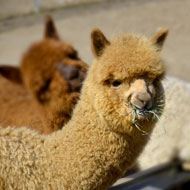
Vets and farmers join together for event featured on BBC Countryfile
An alpaca blood donation event in Derby, which brought local vets and farmers together, is set to feature on BBC Countryfile.
The event in Markeaton involved six alpacas from four different farms, ensuring these animals can provide plasma for baby alpacas in their own herd if needed.
Farm vet Fay Pooley from Scarsdale Vets, who ran the event, explained: “Having spoken to a number of our alpaca-owning clients we had the idea of bringing together a small group of animals to help us build up a supply of plasma."
Baby alpacas, or cria, are born without antibodies, which can leave them vulnerable to serious infections in the first few days of life. Immunity is passed from its mother through colostrum, but if the newborn doesn't drink enough milk in the first 12 hours after birth, it will not receive enough antibodies.
Pooley added: "The best way to correct this is by giving plasma intravenously, which will support their immune system until they are old enough to produce their own antibodies. This is an important way to support herd owners in maintaining healthy animals and we are really pleased to have had such a good turn out from local alpaca farmers.”
The blood collected was sent to Pet Blood Bank UK, which is the only charity in the country that provides a blood bank service for vets. The blood will be processed at the charity’s centre in Loughborough, where it is turned into plasma and frozen for future use. Plasma must only be used within the herd it was collected from to avoid disease transfer.
Wendy Barnett, found of Pet Blood Bank, said: “We are proud to be able to support the veterinary profession with our blood service. One unit of donated alpaca blood goes a long way, to help save the life of a cria.”
One of the attendees, Ingrid Ruston from Amber Valley Alpacas in Derbyshire, added: “The health of our herd is so important to our business and it was also good to meet other breeders and collectively develop a way to support our animals in the future.”
TV presenter Matt Baker took part in filming the event for BBC Countryfile. The programme will air this weekend (Sunday 25 February).



 RCVS Knowledge has welcomed Professor Peter Cockcroft as editor-in-chief for Veterinary Evidence.
RCVS Knowledge has welcomed Professor Peter Cockcroft as editor-in-chief for Veterinary Evidence.